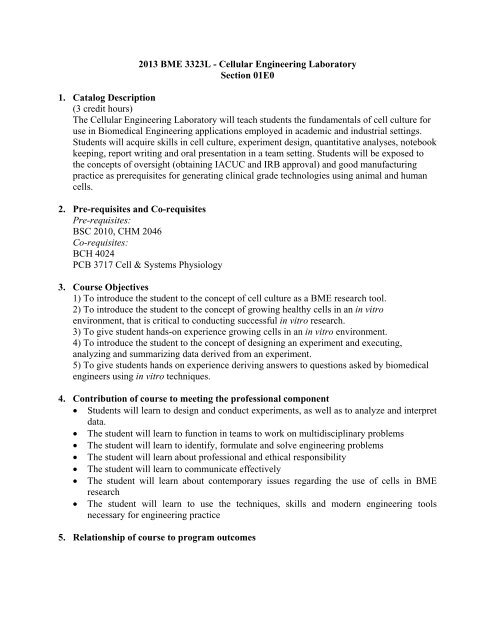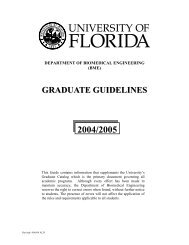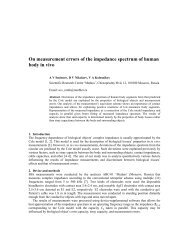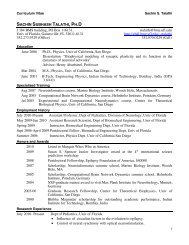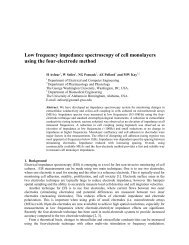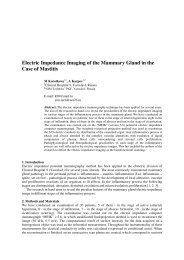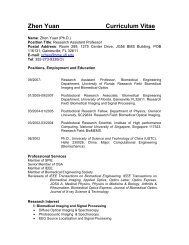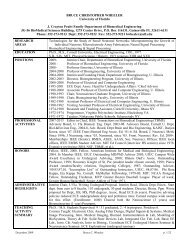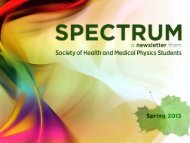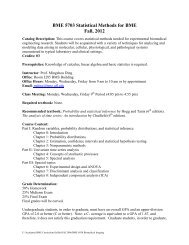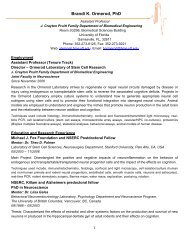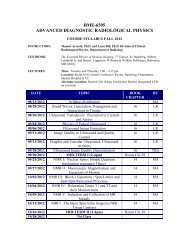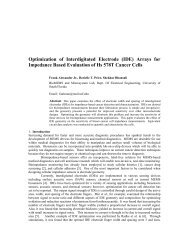Spring 2013 Syllabus - Biomedical Engineering - University of Florida
Spring 2013 Syllabus - Biomedical Engineering - University of Florida
Spring 2013 Syllabus - Biomedical Engineering - University of Florida
Create successful ePaper yourself
Turn your PDF publications into a flip-book with our unique Google optimized e-Paper software.
<strong>2013</strong> BME 3323L - Cellular <strong>Engineering</strong> Laboratory<br />
Section 01E0<br />
1. Catalog Description<br />
(3 credit hours)<br />
The Cellular <strong>Engineering</strong> Laboratory will teach students the fundamentals <strong>of</strong> cell culture for<br />
use in <strong>Biomedical</strong> <strong>Engineering</strong> applications employed in academic and industrial settings.<br />
Students will acquire skills in cell culture, experiment design, quantitative analyses, notebook<br />
keeping, report writing and oral presentation in a team setting. Students will be exposed to<br />
the concepts <strong>of</strong> oversight (obtaining IACUC and IRB approval) and good manufacturing<br />
practice as prerequisites for generating clinical grade technologies using animal and human<br />
cells.<br />
2. Pre-requisites and Co-requisites<br />
Pre-requisites:<br />
BSC 2010, CHM 2046<br />
Co-requisites:<br />
BCH 4024<br />
PCB 3717 Cell & Systems Physiology<br />
3. Course Objectives<br />
1) To introduce the student to the concept <strong>of</strong> cell culture as a BME research tool.<br />
2) To introduce the student to the concept <strong>of</strong> growing healthy cells in an in vitro<br />
environment, that is critical to conducting successful in vitro research.<br />
3) To give student hands-on experience growing cells in an in vitro environment.<br />
4) To introduce the student to the concept <strong>of</strong> designing an experiment and executing,<br />
analyzing and summarizing data derived from an experiment.<br />
5) To give students hands on experience deriving answers to questions asked by biomedical<br />
engineers using in vitro techniques.<br />
4. Contribution <strong>of</strong> course to meeting the pr<strong>of</strong>essional component<br />
Students will learn to design and conduct experiments, as well as to analyze and interpret<br />
data.<br />
The student will learn to function in teams to work on multidisciplinary problems<br />
The student will learn to identify, formulate and solve engineering problems<br />
The student will learn about pr<strong>of</strong>essional and ethical responsibility<br />
The student will learn to communicate effectively<br />
The student will learn about contemporary issues regarding the use <strong>of</strong> cells in BME<br />
research<br />
The student will learn to use the techniques, skills and modern engineering tools<br />
necessary for engineering practice<br />
5. Relationship <strong>of</strong> course to program outcomes
6. Instructors:<br />
Dr. Brandi K. Ormerod (Module 1)<br />
Office: J296, <strong>Biomedical</strong> Sciences Bldg<br />
Phone: 273-8125<br />
Email: bormerod@bme.ufl.edu<br />
Website: http://stemcell.ufl.edu<br />
Office Hours: Mondays 4:00-5:00pm.<br />
Dr. Peter McFetridge (Module 2)<br />
Office: J391, <strong>Biomedical</strong> Sciences Bldg<br />
Phone: 273-9325<br />
Email: pmcfetridge@bme.ufl.edu<br />
Website:<br />
Office Hours: TBA<br />
7. Teaching Assistants:<br />
Mr. Vikram Munikoti (Module 1)<br />
Phone: 273-8179<br />
Email: vmunikoti@ufl.edu<br />
Office Hours: Thursday 2-3 pm.<br />
TBA (Module 2)<br />
8. Meeting Times<br />
Course meets thrice per week<br />
One 50 minute lecture period Mondays<br />
One 3hr lab period on Wednesdays<br />
One 3hr lab period on Fridays<br />
**students will be expected to feed cells independently on Mondays at a time pre-arranged<br />
by the teaching assistant for Module 1.<br />
Don’t be late – you will lose part <strong>of</strong> your participation grade!<br />
9. Class/laboratory schedule<br />
Class meets for:<br />
a) 1 - 50 min lecture per week (Mondays – Period 8; 3:00-3:50pm)<br />
b) 1 – cell feeding session per week (Mondays – Period 6 - arranged with TA)<br />
c) 1 – 180 min laboratory per week (Wednesdays – Periods 8-10; 3:00-6:00pm)<br />
d) 1 – 180 min laboratory (Fridays – Periods 8-10; 3:00-6:00pm)<br />
10. Meeting Location<br />
Monday – BLK (Black Hall) Rm 415.<br />
Monday Cell Feedings, Wednesday and Friday – HHMI Lab located in the Lobby <strong>of</strong> the<br />
<strong>Biomedical</strong> Sciences Building.
11. Material and Supply Fees – TBA<br />
12. Textbooks and S<strong>of</strong>tware Required<br />
1) Culture <strong>of</strong> Animal Cells<br />
R. Ian Freshney<br />
2005, 5 th Edition<br />
ISBN 0471453293<br />
2) Laboratory Manual for Cellular <strong>Engineering</strong><br />
Brandi K. Ormerod and Lan Hoang-Minh<br />
2009, 1 st Edition<br />
Instructor prepared and distributed<br />
3) Publication Manual <strong>of</strong> the American Psychological Association, 6 th Edition<br />
American Psychological Association<br />
ISBN 978-1-4338-0561-5<br />
Other Requirements:<br />
Standard laboratory notebook with carbon copy pages and lined paper<br />
3 Ring Binder to Compile Protocols and Handouts<br />
Hair ties (elastic bands) to tie back long hair<br />
Safety Glasses<br />
Closed toe shoes<br />
13. Recommended Reading<br />
1) Culture <strong>of</strong> Cells for Tissue <strong>Engineering</strong><br />
G. Vunjak-Novakovic and R. Ian Freshney<br />
2006, Volume 7 <strong>of</strong> Culture <strong>of</strong> Specialized Cells<br />
ISBN-13 978-0-471-62935-1<br />
ISBN-10 0-471-62935-9
14. Course Outline<br />
Module 1 – Working with Cultured Cells<br />
Week 1<br />
Lecture 1 ‐ Introduction to the Cell <strong>Engineering</strong> Laboratory Course<br />
Monday - 01/07/13 (50 Min)<br />
Introduction and what’s expected<br />
• Course overview/expectations<br />
• Introduction to Instructors/Teaching Assistants<br />
• <strong>Syllabus</strong> Overview<br />
Laboratory 1 – Writing a Manuscript Style Research Report<br />
Wednesday – 01/09/13<br />
HHMI Lab – 180 min<br />
Required Reading: Look through the APA publication Manual and Read Freshney Chapters 2, 7 and 16.<br />
Learn how to write a research report<br />
Practicum: Learn how to cite, reference and do database searches with Amy Buhler from the<br />
Marsten <strong>Engineering</strong> Library<br />
Assignment: Gather 5 abstracts that describe how culture conditions (cell density,<br />
adherence, free floating, retinoic acid, fetal bovine serum, etc) influence neural<br />
progenitor/stem cell differentiation – due Wed 01/16/13 (bring 5 abstracts to class).<br />
Laboratory 2 – Introduction to Cell Culture and the laboratory<br />
Friday – 01/11/13<br />
HHMI Lab – 180 min<br />
Required Reading: Freshney, Chapter 1<br />
Discussion: Learn about Animal and Human Cell Culture in Academia and Industry<br />
Discussion: Lab and Cell Safety, IACUC and IRB (regulating animal and human cells)<br />
Discussion: Keeping a good lab notebook<br />
Meet your labmates – teamwork for the term!<br />
Practicum: Take a Laboratory Tour<br />
Week 2<br />
Lecture 2‐ Introduction to Cell Culture, Thawing and Plating cells for an Experiment<br />
Monday – 01/14/13<br />
Laboratory 3 – Working aseptically with cells<br />
Wednesday – 01/16/13<br />
HHMI Laboratory (180 min)<br />
Required Reading: Freshney Chapters 3-6.<br />
• Discussion: Design your adult NPC experiment (using info from publications and discussions)<br />
• Turn in 5 Abstracts about NPCs for up to 2% <strong>of</strong> your grade<br />
• Introduction: Learn Aseptic Technique for Keeping your Cell Cultures Clean
• Practicum - Using Equipment in the Laboratory – Pipetting and Centrifuging 101<br />
• Hand in notebook page copy (0.5% <strong>of</strong> grade for module 1)<br />
Laboratory 4 – Thawing and Plating Cells<br />
Friday – 01/18/13<br />
HHMI Laboratory (180 min)<br />
Required Reading: Freshney Chapters 7-10 and 19.<br />
• Discussion: Finalize your NPC experiment hypothesis/research design<br />
• Introduction: Learn how to thaw, plate and count cells (choices, choices, choices)<br />
• Video: Thawing cells<br />
• Practicum – Thawing, counting and plating neural progenitor cells<br />
• Practicum – Use the hemocytometer to quantify live/dead neural progenitor cells<br />
• Hand in notebook page copy (0.5% <strong>of</strong> grade for module 1)<br />
Week 3<br />
No Lecture – Martin Luther King Day<br />
Monday – 01/21/13 Lecture (50 min)<br />
Laboratory 5 – Ick, my cells look sick!<br />
Wednesday – 01/23/13<br />
HHMI Laboratory (180 min)<br />
Required reading Freshney Chapters 12 and 18<br />
• Practicum: Feed and check your NPCs<br />
• Discussion: Factors that affect the happiness <strong>of</strong> your cells including infections<br />
• Introduction to bacterial, yeast, and mold infections.<br />
• Practicum: Contamination Exercise<br />
• Hand in notebook page copy (0.5% <strong>of</strong> grade for module 1)<br />
Laboratory 6 – Passage your Cells<br />
Friday – 01/25/13<br />
HHMI Laboratory (180 min)<br />
Required reading Freshney Chapters 12, 18 and 26<br />
Discussion: Cell Passaging<br />
<br />
<br />
Discussion: Expanding cells for an experiment - How many flasks or chambers???<br />
Practicum: Passage your NPCs<br />
Hand in notebook page copy (0.5% <strong>of</strong> grade for module 1)<br />
Week 4<br />
Lecture 4‐ Reagents and Quality Control<br />
Monday – 01/28/13 Lecture (50 min)<br />
• Feed Cells independently (at time specific by TA).
Laboratory 7 – Are my cells genetically stable?<br />
Wednesday – 01/30/13<br />
HHMI Laboratory (180min)<br />
Required Reading: Chapter 17<br />
• Feed your cells<br />
• Introduction to genetic stability, passaging, and dissociation methods.<br />
• Practicum - Karyotype cells – please be diploid!!!<br />
• Assignment: Turn in your notebook page (0.5% <strong>of</strong> your Module 1 grade).<br />
Laboratory 8 – Analyzing phenotypes<br />
Friday – 02/01/13<br />
HHMI Laboratory (180 min)<br />
• Discussion: How do I collect data? Multiple ways to count cell phenotypes…<br />
Introduction to immunohistochemistry, microscopy and FACS.<br />
Experiment – Passage and count cells (remaining plate not in your experiment).<br />
Fix cells in plate 1 and store in TBS for immunohistochemistry<br />
Fix cells in plate 2 and store in TBS for flow cytometry<br />
Assignment: Turn in your notebook page (0.5% <strong>of</strong> your Module 1 grade).<br />
Week 5<br />
Lecture 5 – Freezing cells, Record Keeping and GMP<br />
Monday – 02/04/13 – Lecture (50 min)<br />
• Introduction to Cell Culture – Freezing Cells, Record keeping and GMP for clinical work<br />
• Feed Cells Independently<br />
Laboratory 9 ‐<br />
Wednesday – 02/06/13 - Laboratory (3hr)<br />
• Fix Cells<br />
• Experiment preparation – design, plate preparation, calculations, media prep, etc<br />
Hand in notebook page copy (0.5% <strong>of</strong> grade for module 1)<br />
Laboratory 10 –<br />
Friday – 02/08/13 - Laboratory (2h)<br />
• Plate cells for experiment<br />
• Freeze Cells<br />
• Hand in notebook page copy (0.5% <strong>of</strong> grade for module 1)<br />
• Hand in methods section <strong>of</strong> report for feedback<br />
Week 6<br />
Lecture 6 – Quantitation and Data Analysis – Morphological Analyses<br />
Monday – 02/11/13 - Lecture (50 min)<br />
Laboratory 11 – Microscopy Analysis<br />
Wednesday – 02/13/13 - Laboratory (180 min)<br />
Antibody Staining
• Fix cells for Immunohistochemistry<br />
• Immunohistochemistry<br />
• Hand in notebook page copy (0.5% <strong>of</strong> grade for module 1)<br />
Laboratory 12‐ FAC Analysis<br />
Friday – 02/15/13 - Laboratory (180 min)<br />
Analysis <strong>of</strong> Antibody Staining<br />
• Continue counting cells using microscopy<br />
• Hand in notebook page copy (0.5% <strong>of</strong> grade for module 1)<br />
Week 7<br />
Lecture 7 – Quantitation and Data Analysis – Molecular Analyses<br />
Monday – 02/18/13 - Lecture (50 min)<br />
Laboratory 13‐ Work on Paper Write Up<br />
Wednesday – 02/20/13<br />
HHMI Laboratory (180 min)<br />
• Discussion: Data Interpretation.<br />
• Practicum: write and questions about data analysis, IEEE format, content, etc.<br />
Laboratory 14‐ Work on Paper Write Up<br />
Friday – 02/22/13<br />
HHMI Laboratory (180 min)<br />
• Discussion: Questions regarding style and content <strong>of</strong> paper sections.<br />
• Practicum: Write and questions about data analysis, IEEE format, content, etc.<br />
Week 8<br />
Lecture 8 ‐ Review<br />
Monday – 02/25/13 - Lecture (50 min)<br />
• Review (Weeks 1-7)<br />
• Report due before class<br />
• Fill out teacher evaluation (0.5% <strong>of</strong> grade)<br />
Laboratory 15 – Exam #1<br />
Wednesday – 02/27/13 - Laboratory (180 min)<br />
• All material learned in weeks 1-7 (lecture, textbook and laboratory) will be tested<br />
Laboratory 16 – no class<br />
Friday – 02/29/13 – Laboratory (180 min)
15. Module 2: Course Outline (Tentative)<br />
Module 2 /1– Hydrogels as scaffolds for engineering 3D tissues<br />
Week 9<br />
No classes – <strong>Spring</strong> Break<br />
Week 10 (Group A), Week 13 (Group B)<br />
Monday – 03/11/13 - Lecture (50 min) –<br />
Experimental overview (two sections – ‘Hydrogels’ and ‘ex vivo derived tissue implants’)<br />
Introduction to Instructors/Teaching Assistants<br />
Overview/expectations<br />
Lab books, write-ups continued<br />
<br />
<br />
<br />
<br />
<br />
Wednesday – 03/13/13 - Laboratory (3h)<br />
Introduction to Hydrogels (Alginate) and mechanics<br />
o Session 1: Prepare hydrogels (different %weight protein), and cell cultures, seed<br />
cells to begin 3 week culture period. Multiple samples set for continued analysis<br />
over 3 week period.<br />
o Session 2: Prepare hydrogels, biomechanical analysis<br />
Friday – 03/15/13 - Laboratory (3h)<br />
Swap sections from Wednesday<br />
o Session 2: Prepare hydrogels (different %weight protein), and cell cultures, seed<br />
cells to begin 3 week culture period. Multiple samples set for continued analysis<br />
over 3 week period.<br />
o Session 1: Prepare hydrogels, biomechanical analysis – compressive stress strain<br />
analysis<br />
Research Assignment – search for publications that describe 2D vs. 3D culture conditions<br />
and discuss pros and cons <strong>of</strong> each approach – due date TBA<br />
Week 11 (Group A), Week 14 (Group B)<br />
Monday – 03/18/13 - Lecture (50 min) –<br />
Experimental overview (two sections – ‘Hydrogels’ and ‘ex vivo derived tissue implants’)<br />
Feeding cells<br />
Wednesday – 03/20/13 - Laboratory (3h)<br />
Continued analysis <strong>of</strong> engineered construct T0+ 1 week<br />
o Session 1: Alamar Blue assay to assess approximate cell density and metabolysm
o Session 2: Biomechanical analysis <strong>of</strong> constructs (as previous week – compressive<br />
stress - strain analysis)<br />
Friday – 03/22/13 - Laboratory (3h)<br />
Swap sections from Wednesday<br />
o Session 2: Alamar Blue assay to assess approximate cell density and metabolysm<br />
o Session 1: Biomechanical analysis <strong>of</strong> constructs (as previous week – compressive<br />
stress - strain analysis)<br />
Week 12 (Group A), Week 15 (Group B)<br />
Monday – 03/25/13 - Lecture (50 min) -<br />
Experimental overview (two sections – ‘Hydrogels’ and ‘ex vivo derived tissue implants’)<br />
Results – what are they going to mean.<br />
Wednesday – 03/27/13 - Laboratory (3h)<br />
Continued analysis <strong>of</strong> engineered construct T0+ 2 weeks<br />
o Session 1: Cell counts/Alamar Blue assays<br />
o Session 2: Biomechanical analysis <strong>of</strong> constructs (as previous week – compressive<br />
stress - strain analysis)<br />
Friday – 03/29/13 - Laboratory (3h)<br />
Continued analysis <strong>of</strong> engineered construct T0+ 2 week<br />
o Session 1: Cell counts/Alamar Blue assays<br />
o Session 2: Biomechanical analysis <strong>of</strong> constructs (as previous week – compressive<br />
stress - strain analysis)<br />
Module 2/2<br />
Week 13 (Group A), Week 16 (Group B)<br />
Ex vivo derived scaffolds for engineering cardiovascular implants<br />
Monday – 04/01/13 - Lecture (50 min) -<br />
Wednesday – 04/03/13 - Laboratory (3h)<br />
Friday – 04/05/13 - Laboratory (3h)<br />
Week 14<br />
Monday – 04/08/13 - Lecture (50 min) -<br />
Wednesday – 04/10/13 - Laboratory (3h)<br />
Friday – 04/12/13 - Laboratory (3h)
Week 15<br />
Monday – 04/15/13 - Lecture (50 min) -<br />
Wednesday – 04/17/13 - Laboratory (3h)<br />
Friday – 04/19/13 - Laboratory (3h)<br />
Report #2 Due<br />
Week 16<br />
Monday – 04/22/13 - Lecture (50 min)<br />
Review – weeks 9-14<br />
Wednesday – 04/24/13 - Laboratory (3h)<br />
Exam# 2 - weeks 9-14<br />
16. Attendance and Expectations<br />
Class participation is required and part <strong>of</strong> the final grade Grading – methods <strong>of</strong> evaluation<br />
(e.g., Lab notebook pages, Reports, Exams)<br />
17. Grading<br />
Module 1<br />
Report Intro 2%<br />
Report Methods 2%<br />
Report Results 2%<br />
Full Report 15%<br />
Exam 20%<br />
Lab Note Book Pages 10%<br />
50%<br />
Module 2<br />
Report 15%<br />
Exam#2 25%<br />
Lab Note Book Pages 10%<br />
50%<br />
18. Grading Scale<br />
A A- B+ B B- C+ C C- D+ D D- E<br />
> 90 87-89 84-86 80-83 77-79 74-76 70-73 67-69 64-66 60-63 57-59 < 56<br />
19. Make-up Exam Policy<br />
Midterm and Final Exam can be made up in extreme circumstances if a Doctor’s note is<br />
presented or death certificate (regarding someone in the immediate family) is presented<br />
before the start <strong>of</strong> the exam.<br />
20. Honesty Policy<br />
All students admitted to the <strong>University</strong> <strong>of</strong> <strong>Florida</strong> have signed a statement <strong>of</strong> academic<br />
honesty committing themselves to be honest in all academic work and understanding that<br />
failure to comply with this commitment will result in disciplinary action. This statement is a
eminder to uphold your obligation as a UF student and to be honest in all work submitted<br />
and exams taken in this course and all others.<br />
21. Accommodation for Students with Disabilities<br />
Students Requesting classroom accommodation must first register with the Dean <strong>of</strong> Students<br />
Office. That <strong>of</strong>fice will provide the student with documentation that he/she must provide to<br />
the course instructor when requesting accommodation.<br />
22. UF Counseling Services<br />
Resources are available on-campus for students having personal problems or lacking clear<br />
career and academic goals. The resources include:<br />
- <strong>University</strong> Counseling Center, 301 Peabody Hall, 392-1575, Personal and Career<br />
Counseling.<br />
- SHCC mental Health, Student Health Care Center, 392-1171, Personal and<br />
Counseling.<br />
- Center for Sexual Assault/Abuse Recovery and Education (CARE), Student Health<br />
Care Center, 392-1161, sexual assault counseling.<br />
- Career Resource Center, Reitz Union, 392-1601, career development assistance and<br />
counseling.<br />
23. S<strong>of</strong>tware Use<br />
All faculty, staff and student <strong>of</strong> the <strong>University</strong> are required and expected to obey the laws and<br />
legal agreements governing s<strong>of</strong>tware use. Failure to do so can lead to monetary damages<br />
and/or criminal penalties for the individual violator. Because such violations are also against<br />
<strong>University</strong> policies and rules, disciplinary action will be taken as appropriate. We, the<br />
members <strong>of</strong> the <strong>University</strong> <strong>of</strong> <strong>Florida</strong> community, pledge to uphold ourselves and our peers<br />
to the highest standards <strong>of</strong> honesty and integrity.


